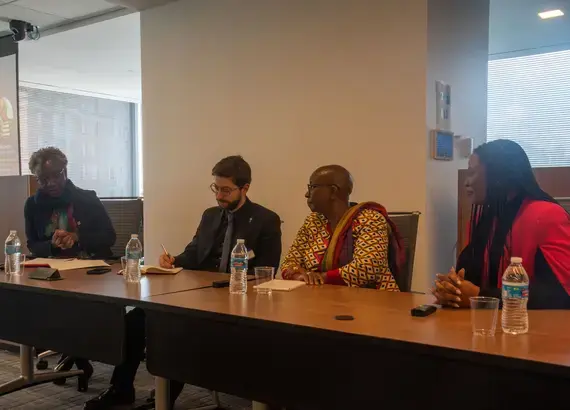
Success Story
Unite to take the fight: 2023 Political Party Peer Network Conference
As authoritarianism solidifies, democracy is declining across the world, with political polarization as one of the most pressing challenges. Political parties are increasingly being targeted by illiberal actors with a common agenda to aggravate division between parties and to weaken functioning multi-party systems. While leaders in long-standing democracies are beginning to grasp the extent of the alarming situation, traditional political parties face difficulties in bridging political divides and uniting to protect core democratic values. As ruling and opposition parties continue to serve as resilient and critical tools of democratic governance against authoritarianism, unity between political actors remains essential to a healthy democracy.
This context set the stage for the 2023 annual meeting of the Political Party Peer (PPPeer) Network – a global community of like-minded organizations in the field of political party support. As this year’s Chair of the PPPeer Network’s Core Group, NDI hosted the meeting on March 27-28 at its headquarters during President Biden’s second Summit for Democracy. Over the course of two days, 70 participants from think tanks, academia and political parties gathered to discuss the topic of polarization and its adverse impact on party work. In addition to the conference, NDI also co-organized a side event together with the Embassy of Sweden, the V-Dem Institute and the EU Delegation. The event centered around the conversation on how democracies outperform autocracies and included keynote speeches from, among others, Johan Forssell, Sweden’s Minister for Trade and Development, and Uzra Zeya, US Under Secretary of State for Civilian Security, Democracy and Human Rights.
The conference began with a discussion on polarization in the global political landscape, featuring renowned experts in the field. Professor Staffan Lindberg, Director of the V-Dem Institute, presented findings from the 2023 Democracy report highlighting the drastic democratic backsliding in the last ten years. In addition to the academic outlook, the confrontation of polarization was discussed during a Speakers’ Corner session. The segment granted participants the opportunity to exchange best practices and experiences on how political party work can be used innovatively to curb polarization and foster democracy.
Notably, NDI convened a broad range of panel discussions on how to confront, navigate and reduce political polarization in contexts where the divergence of political attitudes is present. During a session on cross-collaboration work in the U.S. Congress, two former members of Congress from opposing parties discussed the importance of human interaction between politicians across party lines to jointly strive for the common good. On the issue of historically marginalized groups, Bruno Goncalves, Secretary General of the International Union of Socialist Youth, underscored how polarization has not always been seen as a negative consequence for democracy. The session on the World Movement for Democracy's Crossover Initiative revolved around crossover work across political divides to create policies and solutions to challenges at any level of government. Vedrana Vujovic, Member of Parliament of Bosnia and Herzegovina, emphasized the need for training and capacity-building to help support young political leaders, specifically highlighting NDI’s successful establishment of a youth multi-party dialogue in the country.
During the event, Shanthi Kalathil, former Deputy Assistant to President Biden, Coordinator for Democracy and Human Rights and board member of NDI, spoke about the concept of “Sharp Power”. With the growing presence of authoritarian forces in the global south, she stressed the need for the political party support community to build relationships with parties across the world in order to shape the external environment where undemocratic actors are operating. In closing, the conference focused on the rebuilding of a strong Ukrainian democracy after the war. Ongoing support for democratic institutions, political parties and civil society remains crucial as the country is approaching its general elections and continues to strive to become a member of the European Union.
-
The sessions produced several recommendations for political parties. Political parties need to rebuild citizen trust in democracy; understand the root causes of polarization and shift the discussion toward basic core values and the parties’ role in a healthy democratic society; strengthen cross-party collaboration to find alternatives to populism and division; and strive for diversity within politics, focusing specifically on youth engagement.
The conference also provided an opportunity to connect with NDI’s Political Party Network Collaboration (PPNC) program. Lessons from the conference will inform innovative approaches and best practices, enabling NDI to develop training material and program approaches in the field of polarization.
This year’s gathering of the PPPeer Network reflects the importance of collaboration and unity among stakeholders who still believe in democracy. Together with its partners, NDI continues to play an important role in advancing the work moving forward.
NDI’s engagement with this program is implemented with the support from the National Endowment for Democracy (NED) program.
